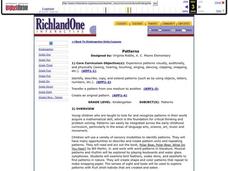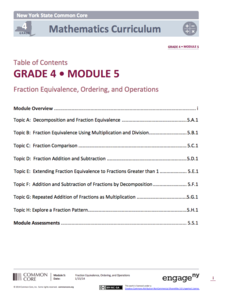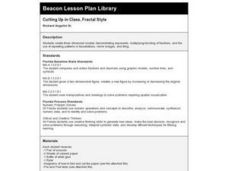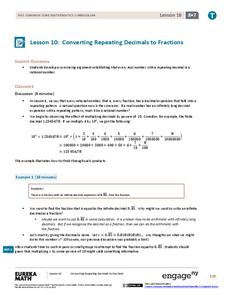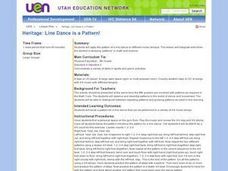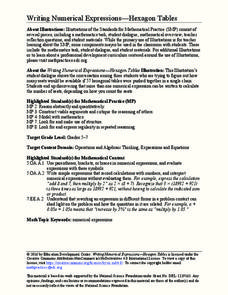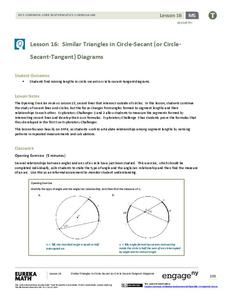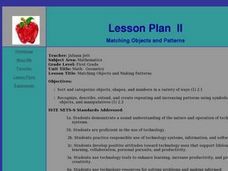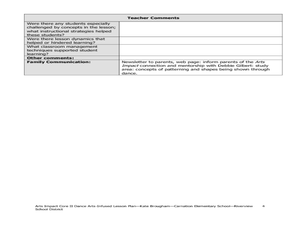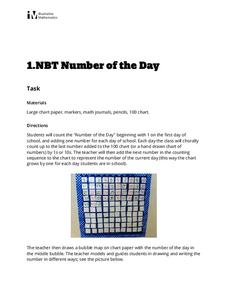PBS
Patterns to the Rescue!
Track down the Cyberchase episode that this lesson is associated with. Using a worksheet that is embedded in the plan, learners must find the next two numbers and shapes (a double pattern). Once these have been discovered, pupils try...
Curated OER
Patterns
Follow the pattern to find what comes next. Youngsters analyze shape patterns to continue the sequence in the provided space. The three patterns increase in difficulty, and then scholars have a chance to create two of their own....
Mathematics Assessment Project
Generalizing Patterns: The Difference of Two Squares
After completing an assessment task where they express numbers as the difference of squares (i.e., 9 = 5^2 – 4^2), class members note any patterns that they see in the problems.
K12 Reader
Extending Patterns
2, 4, 6, 8. What comes next? This reading comprehension learning exercise discusses patterns and extending patterns. After reading the short article, kids answer a series of questions to demonstrate their understanding of the passage.
Curated OER
Patterns
Students create and extend patterns. In this pattern lesson, students learn to identify patterns using multiple senses. Students work at centers in small groups to explore and extend their understanding of patterns.
EngageNY
Fraction Equivalence, Ordering, and Operations
Need a unit to teach fractions to fourth graders? Look no further than this well-developed and thorough set of lessons that takes teachers through all steps of planning, implementing, and assessing their lessons. Divided into eight...
Curated OER
Graph Paper Patterns
Young artists divide a piece of graph paper into sections using rectangles, squares, and triangles. They then fill each section with patterns of shape and color. Elementary graders describe how their patterns are organized. Secondary...
Curated OER
Cutting Up in Class, Fractal Style
Students create three-dimension models demonstrating exponents, multiplying and dividing of fractions, and the use of repeating patterns in tessellations, mirror images, and tiling.
EngageNY
Converting Repeating Decimals to Fractions
Develop a process with your classes for converting repeating decimals to fractions. Through this process, pupils understand that any repeating decimal can be written as a fraction. The 10th lesson in this 25-part module helps reinforce...
Curated OER
Symmetry in Children's Art Experiences
Read between the lines of symmetry to make important connections between math, art, culture, and nature.
Curated OER
Exploring Number Patterns to Discover Common Factors
Young scholars listen and watch a video to see a drummer beat and find a pattern, while learning about the least common factor. In this lesson, the concept of least common factors is being taught through the use of musical instruments,...
Curated OER
Heritage: Line Dance is a Pattern!
Line dancing is the repeating of a pattern of steps, done to music. Teach youngsters how to line dance and they won't feel so awkward when they grow up. Let them experiment with creating their own patterns and teaching their classmates....
Curated OER
It Just Keeps Going and Going...
Students explore patterns, identify patterns, and complete a variety of patterns. They view and discuss an online video and identify the different patterns from the film, then using a hundreds grid create an original pattern using their...
Inside Mathematics
Hexagons
Scholars find a pattern from a geometric sequence and write the formula for extending it. The worksheet includes a table to complete plus four analysis questions. It concludes with instructional implications for the teacher.
Education Development Center
Writing Numerical Expressions—Hexagon Tables
Explore a basic pattern to practice writing expressions. In collaborative groups, learners examine a contextual pattern and write an expression to model it. The task encourages groups to describe the pattern in multiple ways.
EngageNY
Similar Triangles in Circle-Secant (or Circle-Secant-Tangent) Diagrams
First angle measures, now segment lengths. High schoolers first measure segments formed by secants that intersect interior to a circle, secants that intersect exterior to a circle, and a secant and a tangent that intersect exterior to a...
Curated OER
Introductory Lesson- Patterns
First graders explore patterns in mathematical context. In this patterns lesson plan, 1st graders inspect patterns shown to them, copy patterns, complete patterns and create patterns of their own. These patterns are shown by actions,...
Curated OER
Matching Objects and Patterns
First graders participate in hands-on activities and use objects to create patterns. They observe a PowerPoint lesson describing matching objects and patterns. In groups, 1st graders complete geometry computer activities such as planting...
Curated OER
Our Pattern Book
Students demonstrate their understanding of patterns and create patterns to share with others. Each student selects a different set of materials to create a pattern. Digital photographs are taken of each student and his or her pattern.
Curated OER
Dancing Polygons and Non-Polygons with Patterns
Second graders study movements. In this dance lesson plan, 2nd graders draw patterns selecting one to represent through movement with their body.
Alabama Learning Exchange
Unit Circle: Special Angles—Just Know One
It's all about the patterns! Young scholars learn that the unit circle repeats itself in all four quadrants. Using these patterns, they evaluate the sine, cosine, and tangent of special angles.
Illustrative Mathematics
Number of the Day
Daily routines not only help to manage classrooms, they can also provide learners with rich opportunities for learning. This activity supports young learners in developing their number sense by counting up the school days on a class 100...
Mathematics Assessment Project
Discovering the Pythagorean Theorem
Young mathematicians join the ancient order of the Pythagoreans by completing an assessment task that asks them to find the area of tilted squares on dot paper. They then look at patterns in the squares to develop the Pythagorean Theorem.
Curated OER
Math Series: Number Patterns
The focus of this math lesson is representing numbers in different ways. Young mathematicians practice putting numbers into sets, and arriving at answers in new ways. For example, they are asked to, "Show me how to get 7 eyes." A...






